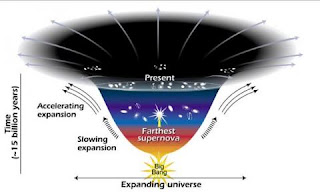Dark Energy and Dark Matter. What is Dark Energy? What is Dark Matter? Why does it matter? I'd like you to explore the current state of knowledge about dark energy and matter. You should find out about the experimental observations that have led scientists to conclude that it exists. You are also going to investigate the theories that try to explain dark energy and matter. I have proposed this topic, precisely because scientists do not yet have the answers, so I want you to experience what science is like when it is new and there are different ideas and theories that compete with each other. I hope you enjoy your learning! https://science.nasa.gov/astrophysics/focus-areas/what-is-dark-energy Task for this week: Read this article and write a post, with the questions that you want to answer over the next 10 weeks.

Baryonic Matter is the matter that only includes matter composed of baryons. In other words, it should include protons, neutrons and all the objects composed of them, but it excludes things such as electrons and neutrinos which are composed of leptons instead of baryons. whereas Non-baryonic matter is matter that, unlike all the kind of matter we are familiar with, it is not made of baryons (including the neutrons and protons found in all atomic nuclei). Proposed as a possible form of dark matter, it could come in two forms; classified as cold non-baryonic matter or hot non-baryonic matter.
ReplyDeleteNeutrinos are one candidate for dark matter but only if they have a nonzero rest mass. Neutrinos interact only via the weak force and gravity which would explain we don't see dark matter. furthermore there are also so many neutrinos that even if they only had a mass one five thousandth that of the electron, the mass of all the neutrinos in the universe could make up for the missing matter therefore is this an answer to where all the missing matter is?
meanwhile baryonic matter is the normal matter that we observe which is very distinct to non-baryonic(the matter which is involved in dark matter). protons and neutrons are made from baryonic matter and therefor cannot interact or have anything to do with dark matter.
Baryonic matter means that something is only composed of baryons. Basically, it should include protons, neutrons and all the objects composed of them, ie atomic nuclei. However the term ‘baryonic’ can also refer to all objects made of normal atomic matter.
ReplyDeleteBaryonic matter could compose a small amount of dark matter.
Non baryonic matter could come in two forms, classified as cold non-baryonic matter or hot non-baryonic matter; hot non-baryonic matter would be made of particles moving very fast, such as neutrinos. Non-baryonic matter (hot or cold) is supposed to interact weakly with radiation. Therefore, the imprints left by the non-baryonic matter in the cosmic background radiation would be different than those left by the baryonic matter.
Neutrinos are considered non-baryonic, this means they're not made of baryons.